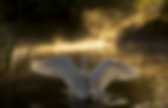

History of Ireland. Prehistoric Ireland spans a period between the first known settlement around 8000 B.C.E. until the emergence of "protohistoric" Gaelic Ireland at the time of Christianization in the 5th century; Celtic Christianity had subsumed or replaced the earlier polytheism by the end of the 6th century.
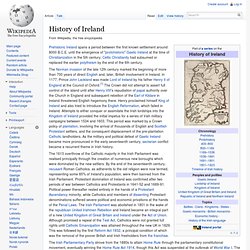
The Norman invasion of the late 12th century marked the beginning of more than 700 years of direct English and, later, British involvement in Ireland. In 1177, Prince John Lackland was made Lord of Ireland by his father Henry II of England at the Council of Oxford.[1] The Crown did not attempt to assert full control of the island until after Henry VIII's repudiation of papal authority over the Church in England and subsequent rebellion of the Earl of Kildare in Ireland threatened English hegemony there.
Henry proclaimed himself King of Ireland and also tried to introduce the English Reformation, which failed in Ireland. Prehistory (8000 BC–400 AD)[edit] History of Wales. Prehistoric Wales[edit] The earliest known human remain discovered in modern-day Wales is a Neanderthal jawbone, found at the Bontnewydd Palaeolithic site in the valley of the River Elwy in North Wales, whose owner lived about 230,000 years ago in the Lower Palaeolithic period.[6][7] The Red Lady of Paviland, a human skeleton dyed in red ochre, was discovered in 1823 in one of the Paviland limestone caves of the Gower Peninsula in Swansea, South Wales.
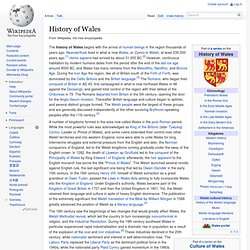
Despite the name, the skeleton is that of a young man who lived about 33,000 years ago at the end of the Upper Paleolithic Period (old stone age).[2] He is considered to be the oldest known ceremonial burial in Western Europe. The skeleton was found along with jewellery made from ivory and seashells and a mammoth's skull. Bryn Celli Ddu, a late Neolithic chambered tomb on Anglesey Following the last ice age, Wales became roughly the shape it is today by about 8000 BC and was inhabited by Mesolithic hunter-gatherers. History of Scotland. Scotland was first decisively settled after the end of the last glacial period (in the paleolithic), roughly 10,000 years ago.
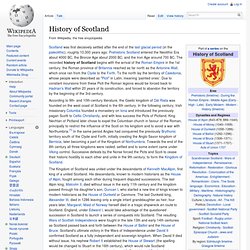
Prehistoric Scotland entered the Neolithic Era about 4000 BC, the Bronze Age about 2000 BC, and the Iron Age around 700 BC. The recorded history of Scotland begins with the arrival of the Roman Empire in the 1st century, the Roman province of Britannia reached as far north as the Antonine Wall, which once ran from the Clyde to the Forth. To the north lay the territory of Caledonia, whose people were described as "Picti" in Latin, meaning ‘painted ones’. Due to constant incursions from these Picti the Roman legions would be forced back to Hadrian's Wall within 20 years of its construction, and forced to abandon the territory by the beginning of the 3rd century. History of England. The end of Roman rule in Britain facilitated the Anglo-Saxon settlement of Britain, which historians often regard as the origin of England and of the English people.
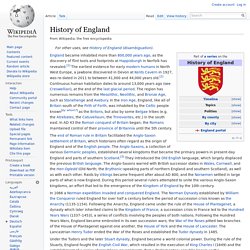
The Anglo-Saxons, a collection of various Germanic peoples, established several kingdoms that became the primary powers in present-day England and parts of southern Scotland.[3] They introduced the Old English language, which largely displaced the previous British language. The Anglo-Saxons warred with British successor states in Wales, Cornwall, and the Hen Ogledd (Old North; the Brythonic-speaking parts of northern England and southern Scotland), as well as with each other. Raids by Vikings became frequent after about AD 800, and the Norsemen settled in large parts of what is now England. History of the United Kingdom. A published version of the Articles of Union, agreement that led to the creation of the Kingdom of Great Britain in 1707 The history of the United Kingdom as a unified sovereign state began in 1707 with the political union of the kingdoms of England and Scotland,[1] into a united kingdom called Great Britain.
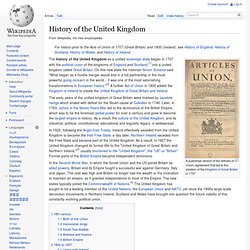
On this new state the historian Simon Schama said "What began as a hostile merger would end in a full partnership in the most powerful going concern in the world... it was one of the most astonishing transformations in European history.